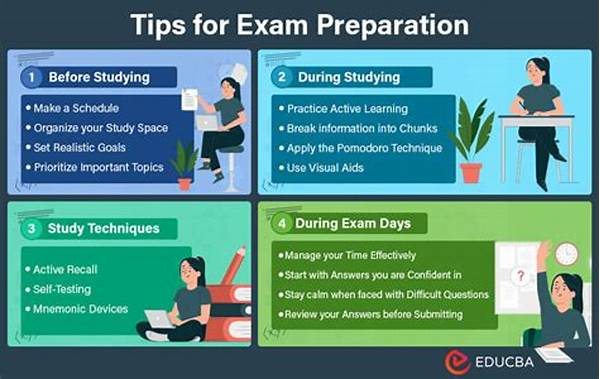In today’s competitive academic environment, effective strategies for exam preparation have become increasingly essential for students seeking to excel in their exams. An organized and well-structured approach not only alleviates the anxiety associated with exams but also optimizes performance. Understanding and implementing such strategies can make a significant difference in achieving academic success. This article aims to provide a comprehensive overview of such strategies, offering students the tools they need to enhance their study sessions and boost their confidence as exam day approaches.
Read Now : Techniques For Boosting Student Enthusiasm
Importance of Time Management in Exam Preparation
Time management is a cornerstone of effective strategies for exam preparation and is crucial for students aspiring to achieve academic excellence. By allocating specific time slots to different subjects, students can ensure a balanced approach to their study sessions. This avoids the common pitfall of overemphasis on certain areas to the detriment of others. Establishing a study schedule also reduces procrastination, a common obstacle faced by many students. A structured timeline, complete with dedicated breaks, allows students to maintain focus and retain information more efficiently. Furthermore, learning to prioritize tasks enables students to address more challenging subjects first, ensuring that they receive adequate attention. Consequently, mastery over time management not only enhances academic performance but also cultivates skills beneficial beyond academic pursuits.
Five Essential Techniques for Exam Success
1. Setting Realistic Goals: Effective strategies for exam preparation begin with setting achievable goals to maintain motivation and direction. Goals should challenge students while remaining attainable.
2. Active Reading Techniques: Engage with materials through summarization and questioning to enhance retention. Such engagement makes information processing more efficient and enjoyable.
3. Utilizing Past Papers: Reviewing past exams provides insights into question patterns and helps deduce potential challenges. This technique aids in identifying weak areas needing improvement.
4. Group Study Sessions: Collaborating with peers allows for sharing different perspectives, fostering deeper understanding, and mutual support. Such interaction can clarify complex topics and reinforce learning.
5. Regular Review Sessions: Regularly revisiting notes and materials solidifies knowledge and commits information to long-term memory, crucial for effective strategies for exam preparation.
The Role of a Conducive Study Environment
A conducive study environment plays a pivotal role in the effectiveness of exam preparation strategies. Crafting a distraction-free study space is of paramount importance in ensuring concentration and efficiency. Attention-oriented settings, equipped with necessary materials, promote seamless study sessions. Lighting, comfortable seating, and organization all contribute to a productive environment. Furthermore, minimizing interruptions by distancing electronic devices or implementing study apps to block distracting websites can enhance focus. Personalizing the study space with motivational quotes or inspirational material can also help maintain enthusiasm and drive. Ultimately, the right environment complements effective strategies for exam preparation, supporting both focus and absorption of information.
Read Now : Optimizing Talent In Startup Environments
Integrating Technology into Study Practices
Technological advancements have revolutionized the way students implement effective strategies for exam preparation. Digital tools such as educational apps, online resources, and interactive modules offer innovative ways to engage with material. Apps dedicated to flashcards, quizzes, or time management assist in creating dynamic study sessions. Online platforms often provide detailed explanations and video tutorials, expanding access to different learning methods. Additionally, technology facilitates connections with peers and educators through virtual study groups and discussion forums. The convenience and resources offered by digital tools bolster traditional study methods, ensuring a well-rounded preparation for academic assessments.
Challenges and Solutions in Exam Preparation
Despite the plethora of effective strategies for exam preparation, students may encounter various obstacles on their academic journey. A common challenge is maintaining consistent motivation across extended study periods. Students can combat this by setting smaller, manageable objectives that provide a sense of accomplishment. Another challenge relates to tackling complex subjects that may seem insurmountable; this can be addressed through breaking down tasks into segments, creating a more approachable study pathway. Stress management also plays a critical role, with techniques such as mindfulness, exercise, and adequate rest proving invaluable. Through strategic planning and perseverance, students can navigate these challenges and position themselves for success.
Conclusions Drawn on Effective Exam Strategies
In summary, effective strategies for exam preparation encompass a multitude of facets aimed at optimizing academic achievement. Central to these strategies is the ability to manage time effectively, ensuring that each subject receives due attention. Equally important is fostering a conducive study environment, where students can immerse themselves in their learning journey without distractions. The integration of technology into study practices further enhances preparation by offering diverse resources and dynamic interaction. While challenges are inevitable, proactive measures and a comprehensive approach empower students to overcome obstacles. Ultimately, these strategies provide a robust framework, equipping students with the skills necessary to excel in their examinations.
In Closing
In conclusion, effective strategies for exam preparation necessitate a holistic approach, blending time management, resource utilization, and adaptability. Cultivating a dedicated study environment and integrating modern technology into traditional practices enhances the learning experience. Despite potential challenges, students equipped with these strategies can confidently navigate their academic responsibilities. This comprehensive preparation not only aims to improve examination results but also fosters lifelong skills essential for personal and professional growth. As students implement these strategies, they prepare not only for academic success but also for future endeavors that may require similar diligence and strategic thinking.
